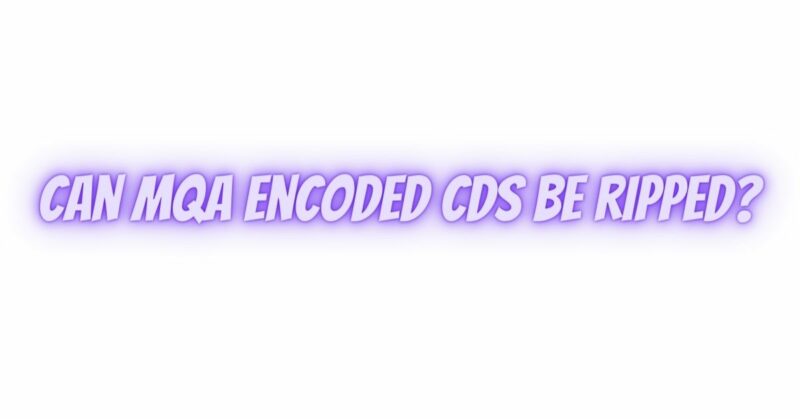Master Quality Authenticated (MQA) is a high-resolution audio technology that has garnered attention for its promise of delivering studio-quality sound in a compact format. MQA-encoded CDs are one of the ways this technology has been integrated into physical media. However, the question that often arises is whether MQA encoded CDs can be ripped or converted to digital files for playback on various devices. In this article, we’ll explore the nuances of MQA technology and the possibilities and limitations of ripping MQA encoded CDs.
Understanding MQA
MQA is an audio encoding and decoding technology developed by MQA Ltd. It’s designed to deliver high-resolution audio in a format that’s convenient for streaming, downloading, or playback on various devices. MQA achieves this by encoding high-resolution audio into a more compact file size, making it suitable for distribution and playback even on mobile devices.
Ripping MQA Encoded CDs
Ripping an MQA encoded CD presents a unique set of challenges and considerations:
- Lossless vs. Lossy: MQA encoded CDs can contain both standard CD quality (16-bit/44.1 kHz) and higher-resolution MQA data. When you rip an MQA encoded CD, you’ll typically extract the CD quality layer as a standard lossless audio file (e.g., FLAC or WAV). However, extracting the full MQA resolution with its proprietary encoding can be more complex.
- MQA Decoding: To access the full MQA quality, you need an MQA-capable decoder, which is typically found in MQA-enabled digital-to-analog converters (DACs) or software players. Without an MQA decoder, you’ll only be able to access the CD-quality layer of the MQA encoded CD.
- Software and Hardware Compatibility: Not all CD ripping software or hardware supports MQA decoding. You’ll need to use a compatible CD ripper that can recognize and properly handle MQA encoded CDs to extract the high-resolution MQA layer.
- File Format: The extracted MQA files are usually stored in a specific format (e.g., MQA FLAC). Playback of these files may require MQA-compatible software or hardware to decode and render the audio correctly.
- Quality and Source: The quality of the extracted MQA audio depends on the source material and the capabilities of the MQA encoder used during the CD mastering process. Some MQA encoded CDs may offer noticeable improvements in audio quality, while others may not be as discernible.
Legal and Ethical Considerations
When ripping any copyrighted material, including MQA encoded CDs, it’s essential to adhere to copyright laws and licensing agreements. Make sure you have the legal right to make personal copies of the CD for personal use and that you’re not infringing on any copyrights.
Conclusion
Ripping MQA encoded CDs is possible, but it comes with specific technical and compatibility requirements. To fully capture the high-resolution MQA layer, you’ll need an MQA-capable CD ripper, software, or hardware, along with a compatible DAC or player for playback. If you’re interested in preserving the full MQA quality, it’s essential to research and invest in the necessary equipment and software to ensure a seamless and high-fidelity experience.


